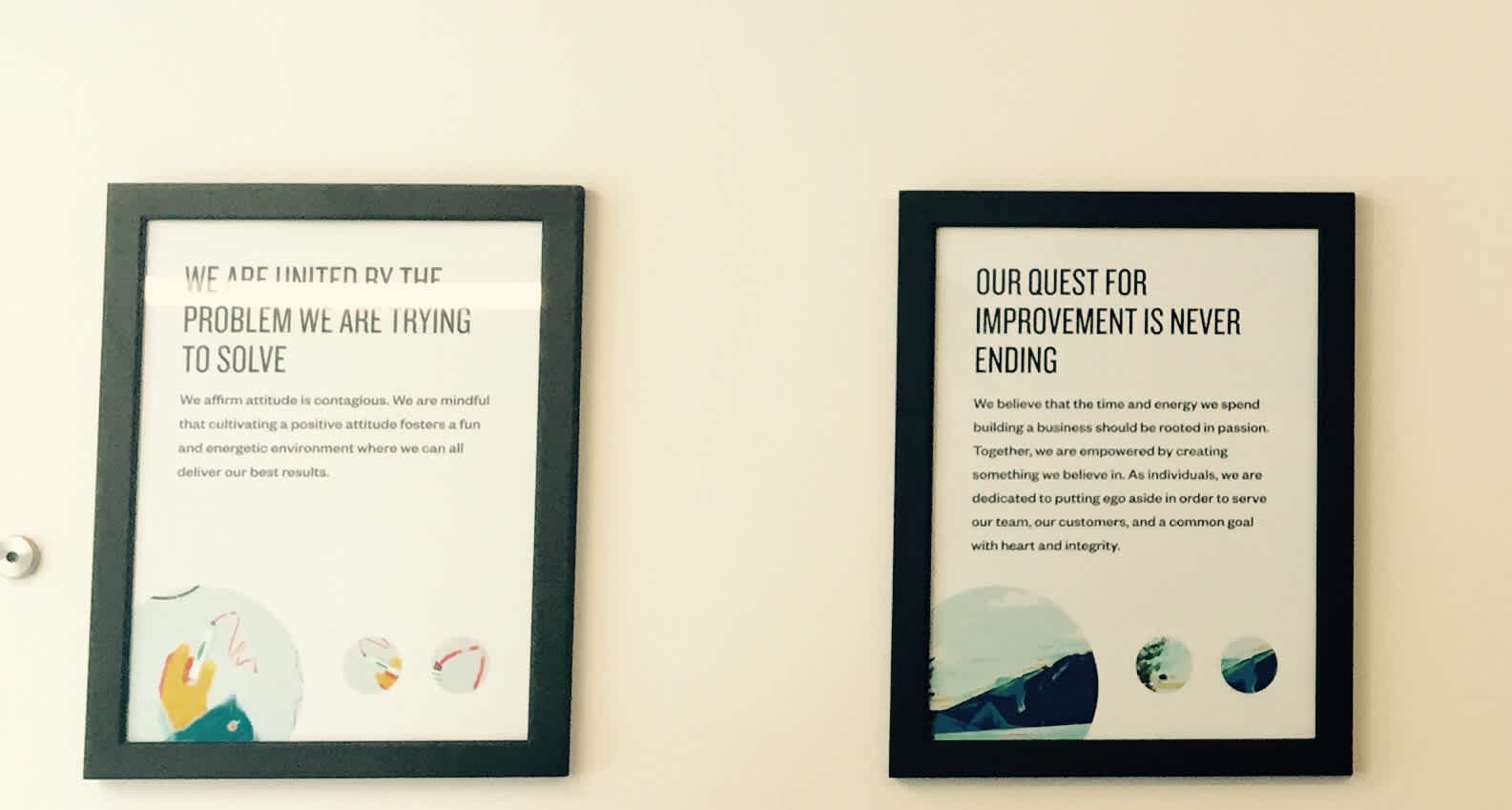If you visit just about any company’s website, chances are, you’ll find some sort of manifesto decreeing their core values. But what does it really mean to stand by these beliefs? For many companies, the values will remain just that — a tab on their website. But smart leaders recognize that a strong set of shared principles can serve as a powerful business tool, helping them to make tough decisions fairly and swiftly.
Q&A with PivotDesk CEO David Mandell
For the third and final installment of the Fearless Confessions series, David Mandell, CEO of office sharing marketplace, PivotDesk, shares how his team created a set of values worth sticking to, and how you can take steps to do the same.
PivotDesk's company values include a positive attitude, quest for improvement, learning from experiences, and working together.
Why did you decide PivotDesk needed to formalize its core values?
When you’re small, as a CEO, it’s easy to pick and choose hires who will reflect the values you want in your business. But when you get to 10...15 people, you start to lose control. Once your team starts to take on the hiring process, you need to have a foundation of core values for them to draw on when making hiring decisions.
I decided it was time to formalize our values about a year and a half ago. At the time, we were in a place where we were hiring quickly, testing new ideas, and finding ways to become more efficient. Amidst all of that change, we needed a set of guidelines that would transcend across everything we were doing.
Solidifying our core values was our way of anchoring the company to something meaningful.
And as a dispersed team — we’ve got employees in San Francisco, Boulder, Boston and NYC — it was especially important for us to stay unified. No matter what city we’re hiring in, we now have a way to measure everyone equally. They give us a point to move forward from together, even when we’re thousands of miles apart.
What was the process for formalizing these values?
To start, I knew that these values needed to come from my team, not just me. Of course, I had ideas which informed the direction the business was heading in and the people I hired, but ultimately, my team shapes how those values and goals evolve over time. And trust me, you don’t want a dictatorship. You want people to believe in and buy into what you’re doing.
Next, I needed to make sure I was getting all of the information. As much as a CEO can try, they never have all the info, because as your team grows people will stop talking to you. They’ll talk amongst themselves or they’ll talk to middle management. The challenge for the CEO then becomes finding a way to surface those voices.
Related article: Take These 6 Steps When Redefining Your Company Values
In our case, I brought together my leadership team for an off-site and hired a moderator to facilitate the discussions that ultimately led us to codify our core values.
I’m a huge believer in values and culture coming from the top down. If you and your leadership team don’t embody the values you’re trying to promote, no one will.
Getting everyone out of their every-day work environment and bringing in an outside perspective to moderate the session was key. You don’t necessarily need to hire someone, but you need to find someone with a neutral point of view who isn’t afraid to disagree with the CEO.
Here’s how the process played out:
Honest discussion - Leadership team met for a full day with a moderator. Our discussions ran like therapy sessions — rather than saying “what do you think the values should be?” the moderator asked questions that sparked meaningful conversations from which we pulled out the key values we wanted to maintain.
Voting - Once we had a list of potential values, everyone got five votes to distribute across the ones they thought were most important. This shows you what people feel most strongly about.
Language - When we had our values laid out, we crafted the language with which we described them very carefully. This was huge. The words you use matter and have a huge affect on how the values are perceived.
Feedback - Then, we presented the values to the greater team and created an anonymous feedback loop.
Display - When the values were final and approved by everyone on the team, we got them framed and hung them on the wall. We wanted to make them very present.

Above: PivotDesk's four values displayed at work.
Would you have done anything differently?
Honestly, yes.I would have involved the greater team earlier on. The plan was for the executive team to meet and come up with a v1 of the values before involving the company, simply as a way of moving faster. But when we presented the values we had created to the team, we didn’t get the participation I would have wanted. People had positive feedback but didn’t feel the need to make changes/edits because the process was already under way.
Values Are the Ultimate Measuring Stick
How have you used these values to make business decisions since creating them?
Most commonly we use them for tough decisions like when to hire someone and when to let someone go.Often, with these tough choices, you’ll find yourself trying to see the best in someone or decide whether you can help them. Company values are the ultimate measuring stick for who should and should not be part of your business.Ultimately, you’ll miss some goals and fail to hit certain projections — you can’t necessarily control that. But you can control the attitudes of the people you choose to drive your business. The values should make it black and white who will align with your goals.At our stage, it’s crucial that we’re all moving forward together. Our values help us ensure we’re doing that.
What are some ways you ensure these values are upheld?
I’m a huge believer in values and culture coming from the top down. If you and your leadership team don’t embody the values you’re trying to promote, no one will.I think the best way to ensure this, is to look at all the processes that support your company — company meetings, cultural activities, hiring process…Are your values present in all of these functions? If not, it’s time to start making changes. If you’re going to bother to formalize your values, they need to be present everywhere.
How do you know if you should change your values?
Your businesses is constantly changing so yes, eventually, your values may need to shift too. I think it’s smart to evaluate yearly — gather your team and ask everyone if they still stand by the values you’ve established? If not, it’s time to edit. And that’s ok.
Any words of wisdom for a company setting out to establish core values?
Once in awhile, try to get your head out of the weeds and look up to evaluate the big picture. If nothing else, this gives you a chance to pause and ask yourself: “Are we good people doing good things?” In the end, that’s all that really matters.
Learn more with Justworks’ Resources
Scale your business and build your team — no matter which way it grows. Access the tools, perks, and resources to help you stay compliant and grow in all 50 states.







